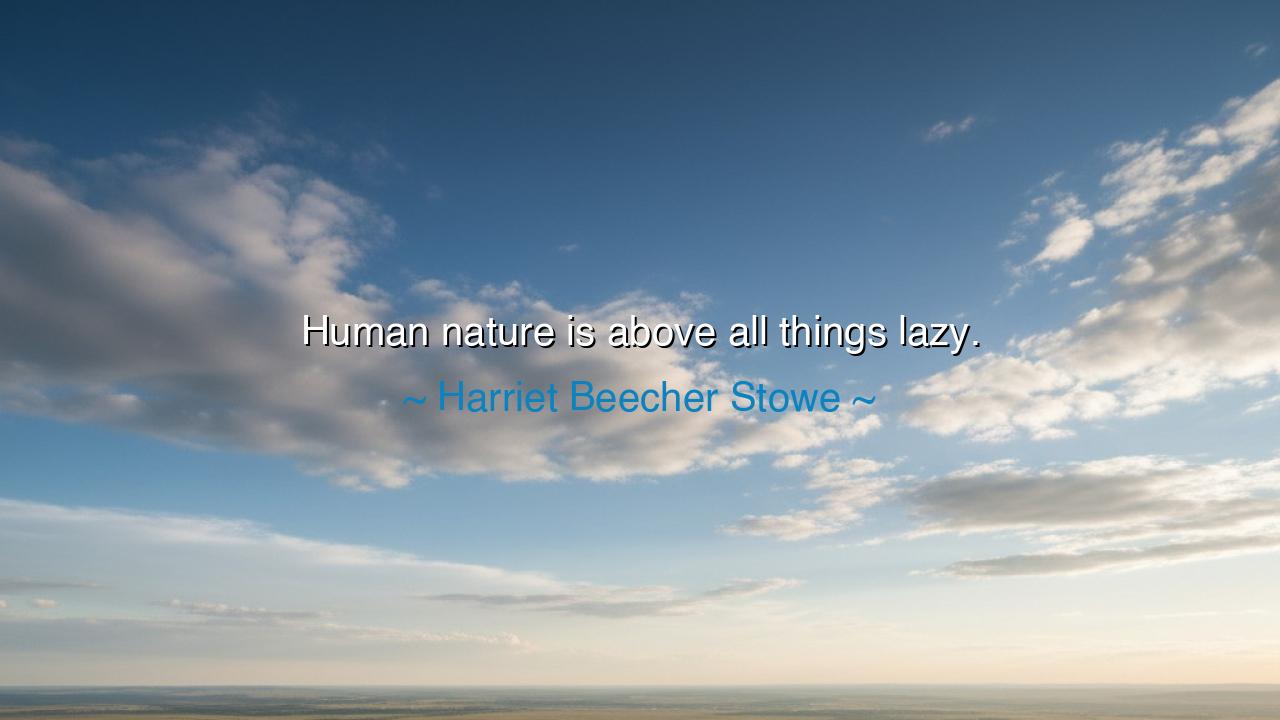
Human nature is above all things lazy.






The words of Harriet Beecher Stowe—“Human nature is above all things lazy”—speak with a sober, almost prophetic authority, as if lifting the veil on a truth too often ignored. Here, the laziness of human nature is not merely physical idleness, but a tendency toward inaction, avoidance, and the path of least resistance. Stowe, who witnessed the struggles of humanity in her time, observed that while the spirit is capable of greatness, it often yields to comfort, fear, or convenience, forsaking the exertion required for moral courage, labor, or the pursuit of justice.
The meaning of this reflection is profound: to recognize laziness in human nature is to see both the danger and the opportunity. Laziness is the fertile soil in which stagnation, injustice, and suffering take root, for humans often avoid effort until circumstance forces action. Yet awareness of this tendency allows the wise to confront it, to cultivate discipline, and to turn potential inaction into deliberate and meaningful action. It is a call to vigilance against the natural inclinations of the mind and body toward ease over virtue.
History offers stark illustrations of this truth. Consider the citizens of Athens before the Persian invasions, when civic participation waned and complacency grew among the populace. Only when the danger became immediate did they rally to defend their city, revealing that while human nature tends toward laziness, crises awaken action and courage. Stowe’s observation warns that without conscious effort, the human spirit may remain dormant until necessity compels it to awaken.
Even the moral struggles of individuals reflect this principle. The life of Abraham Lincoln, who wrestled tirelessly with the moral and political crises of his age, stands as a counterpoint. He recognized the natural inclination toward comfort and inaction in himself and others, yet he persisted in effort, laboring for the abolition of slavery and the preservation of the Union. Lincoln’s life demonstrates that while laziness is inherent, it can be overcome through sustained discipline, vision, and moral clarity.
The lesson, O seekers of wisdom, is that self-awareness is the first step in overcoming the inherent laziness of human nature. One must recognize the temptation to avoid effort, to procrastinate, or to defer moral and intellectual responsibility. Laziness is not merely a personal flaw—it is a condition of the soul that must be actively countered through deliberate engagement, purposeful labor, and the pursuit of meaningful goals.
Practically, this means cultivating habit, discipline, and reflection. Structure your day to ensure that important tasks are attended to before distractions seize your attention. Engage in physical, intellectual, and moral exercises that challenge the natural pull toward ease. Observe your own tendencies and confront them honestly, using the awareness of human laziness as a compass for cultivating virtue and purpose.
Thus let it be inscribed upon the scrolls of memory: human nature, though capable of greatness, is prone to laziness, seeking comfort over exertion, ease over growth. Harriet Beecher Stowe’s insight is both a warning and a guide: recognize the slothful tendencies within, and actively choose action, discipline, and effort. In confronting the natural laziness of the mind and heart, one awakens the potential for courage, creativity, and moral triumph.






AAdministratorAdministrator
Welcome, honored guests. Please leave a comment, we will respond soon